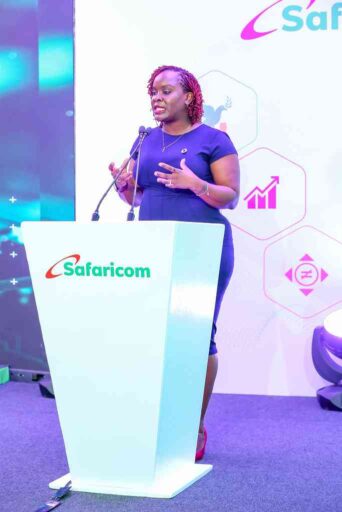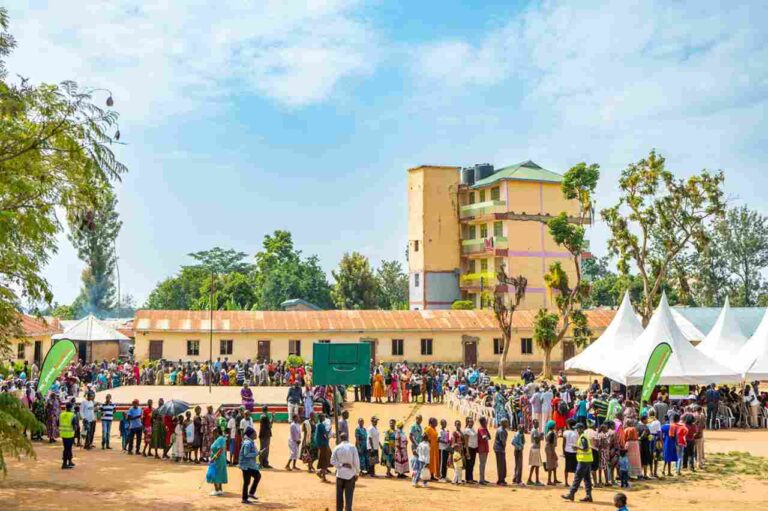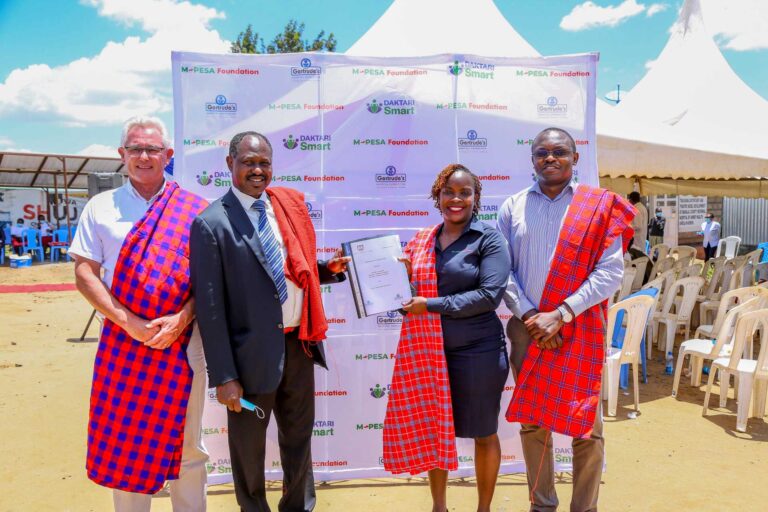For more than 15 years, the M-PESA Foundation has been a beacon of hope and innovation in Kenya, quietly transforming millions of lives.
At the heart of this impact is Karen Khayanje Basiye, Director of Sustainable Business, Social Impact, and M-PESA Foundation, whose vision and leadership have propelled the Foundation to the forefront of social change.
In an exclusive interview, Karen shared the Foundation’s journey, its philosophy, and the tangible, life-changing results of its work across health, education, environment, and economic empowerment.

A Purpose Rooted in Transformation
“The M-PESA Foundation is a baby of M-PESA and the company (Safaricom). We all share the same purpose of transforming lives,” Karen begins, her voice carrying both pride and responsibility.
“For the last 15 years, we have worked in education, health, economic empowerment, environment, and livelihoods.”
Established in 2010, the Foundation was conceived with a clear mandate: to empower and transform communities by enabling them to maximise their potential.
Unlike its predecessor, the Safaricom Foundation, which focused on numerous small-scale projects, the M-PESA Foundation made a strategic shift.
“We wanted to focus on long-term, capital-intensive projects because we felt that’s where we could do the biggest need,” Karen explains.
This decision has resulted in an investment of approximately KES 11 billion, directly benefiting 7 to 8 million people and indirectly impacting 35 million more.
Health: Saving Lives, Restoring Dignity
Maternal and Child Health—Uzazi Salama
Health is a cornerstone of the Foundation’s work. Its flagship Ksh 150 million program, Uzazi Salama (‘Safe parenting’), targets reproductive, maternal, newborn, adolescent, and child health.
“We do a lot of programs around improving hospital infrastructure, especially for the maternal wings,” Karen says.
In Samburu, the Foundation did not just build a ward—they overhauled the entire county’s maternal health infrastructure, dramatically reducing maternal and newborn mortality rates by 75%.
“We do this so that we improve the maternity, maternal, and newborn mortality rates.”
Uzazi Salama has since expanded to Homa Bay, Kilifi, and Lamu. The Foundation is currently active in 30 counties, building new maternal units equipped with incubators and neonatal care facilities.
“One of our newborn units is even better than the Kenyatta National Hospital one,” Karen notes with pride.
According to Safaricom’s 2024 Sustainability Report, 85,367 women of reproductive age and children under five years have benefited from the Uzazi Salama initiative.
Fistula Program
Beyond infrastructure, the Foundation restores dignity to women and girls through its fistula program, providing routine surgeries in Bungoma, Kilifi, Nyeri, Murang’a and Bomet counties.
“We restore dignity for girls and women,” Karen emphasises, highlighting the Foundation’s commitment to holistic health.
“We supported seven fistula camps across Migori, Kilifi, Bungoma, Tharaka Nithi, Garissa, and Homa Bay Counties, restoring dignity for women and girls affected by female genital fistula with 429 surgeries against a target of 1,000.”
Technology in Healthcare
Technology is a game-changer. Through the Daktari Smart programme, the Foundation connects clinical officers in Homabay, Samburu, Lamu, Narok and Baringo counties to paediatricians at Gertrude’s Children’s Hospital via telemedicine.
Daktari Smart is a kit that comprises electronic medical devices such as the Electronic Stethoscope, Vital Signs Monitor, Derma scope Camera, Ultrasound Machine, Otoscope (to examine the condition of the ear canal and eardrum), and the electrocardiogram (ECG) used to check the heart’s rhythm and electrical activity.
In 2024, the programme provided high-quality healthcare to 8,560 children in remote counties with no resident paediatrician.
“Technology has been able to heavy-lift a lot,” Karen says. “A clinical officer in Lamu can now consult a paediatrician in Nairobi in real-time, ensuring even the most remote children receive specialised care.”
The vision extends further. “I can’t wait to see the day a doctor in Singapore can operate on a patient in Kenya using holograms,” Karen muses, showing the Foundation’s commitment to leveraging cutting-edge technology.
Emergency Response
The Foundation responds swiftly to disasters and emergencies, collaborating with government and partners to provide transport, medical camps, and support to those in distress.
“If we see there’s a need now, we act,” Karen says simply.
Education: Building the Next Generation
M-PESA Foundation Academy and ICT-Ready Schools
The M-PESA Foundation Academy stands as a flagship project, nurturing future leaders from underprivileged backgrounds.
“We are in 35 counties building new schools with ICT integration, focusing on children from marginalised backgrounds,” Karen shares.
In FY 24, the academy educated 551 students from poor backgrounds and enrolled 568 in tertiary institutions globally.
Keeping Girls in School
After the tragic suicide of a 13-year-old girl shamed by a teacher for lacking sanitary towels, the Foundation acted.
“That year, we gave all the girls—around 800,000 of them—sanitary towels,” Karen recalls. The “Keeping Girls in School” initiative ensures girls stay in school with dignity and confidence.
Partnerships in Education
The Foundation’s impact is amplified through partnerships.
“You cannot achieve much if you think you can do it alone,” Karen asserts.
The Ministry of Education, World Bank, and Safaricom are key partners, collaborating to renovate schools and train teachers in digital skills.
“We don’t build new schools from scratch—we renovate existing ones, integrating ICT and modern facilities,” Karen explains.
Economic Empowerment: Creating Opportunity
Microcredit and Capacity Building
Economic empowerment is central to the Foundation’s work. “We have a microcredit and capacity-building program for women in Kawangware and Mathare, and we aim to scale this,” Karen says.
The program equips women with financial literacy, digital skills, and the capital needed to launch and grow their businesses.
Youth Skills and Vocational Training
Listening to the youth, the Foundation has tailored its scholarship and vocational training programs to be practical and responsive. “You cannot tell the youth of Kenya today to go and study for three years,” Karen observes.
“They told us: ‘Train me in three months, send me to the field, and if I get stuck, let me come back.’ That’s what we do.”
Graduates leave with entrepreneurial, digital, and financial skills, plus toolkits to start working immediately. The hospitality scholarship program is particularly successful.
“99.9% of our hospitality scholarship graduates are absorbed into the shipping industry, luxury cruises, or new hotels. Most of the good waiters you see probably came from our course.”
Innovation and Technology: The Heartbeat of Impact
The Foundation’s alignment with Safaricom’s vision as a technology leader is evident. From AI-driven scholarship selection to telemedicine and digital agriculture, technology is woven into every initiative.
“When we are doing Daktari Smart, we realised that the counties will never be able to have a paediatrician in each county. Technology bridges that gap,” Karen explains.
AI is now being used to sift through thousands of scholarship applications, ensuring the most deserving students are selected efficiently and fairly.
“Somebody in Safaricom is building us an AI model to go through the key things in those 1,000 applications,” Karen says, though she admits she still likes to read every child’s story herself.
“We are transitioning from limited product development to integrating advanced AI and full digital solutions. Our focus is on using AI to enhance life and stay ahead of trends while ensuring responsible and ethical innovation. Engaging with regulators is key to ensuring that emerging technologies like AI and robotics foster, rather than hinder, innovation,” she says in the FY 24 sustainability report.
The Power of Partnerships
Partnerships are the Foundation’s lifeblood. “We have all manner of partnerships,” Karen says.
From government ministries and the World Bank to local philanthropists and international donors like the Conrad Hilton Foundation, collaboration is key to scaling impact.
“These partnerships allow us to stretch our resources and reach more people,” Karen explains. Whether it’s co-funding school renovations with the Constituency Development Fund (CDF) or working with high-net-worth individuals, the Foundation’s open, collaborative approach ensures sustainability and reach.
Vision for the Next 15 Years
The future is ambitious. “We want every county to have a modern, technology-integrated school, a modern maternal health unit, and a high school with ICT integration,” Karen envisions.
For instance, in FY 25, in health, they aim to advance mobile health applications to improve health education, streamline diagnosis, and enhance treatment adherence. In humanitarian aid, the aim is to expand mobile emergency response systems to support communities during crises.
Also, developing remote patient monitoring systems to enable healthcare providers to effectively manage chronic conditions from afar. Additionally, refine telemedicine platforms to facilitate seamless remote consultations with healthcare professionals.
The upcoming “Citizens of the Future” program aims to modernise 600 schools, upgrade classrooms, build ICT and science labs, and provide scholarships for senior secondary students.
Women’s empowerment is also on the agenda. The “M-PESA Mama” initiative will provide grants, training, digital and financial literacy, and
connectivity to at least 5,000 women, helping them become bankable entrepreneurs.
Environmental restoration continues, with plans to restore City Park in Nairobi and protect water towers.
Medical camps and fistula surgeries will expand, and the Foundation will focus on the counties most in need, replicating the successful Samburu model.
A Legacy of Hope and Innovation
Karen Basiye’s leadership at the M-PESA Foundation is a testament to visionary, adaptive, and compassionate philanthropy.
Her commitment to leveraging technology, fostering partnerships, and responding to real community needs has set a new standard for social impact in Africa.
“We are trying to shape the current and next generation to be well-rounded, educated, and skilled citizens,” Basiye reflects, adding that, “We shall continue working in education, but with an expanded scope in health and economic empowerment, leveraging technology to deliver.”
The M-PESA Foundation continues to be a beacon of hope, innovation, and sustainable change, building a better future for Kenya and beyond.
Additional reporting from Lynet Okumu.






